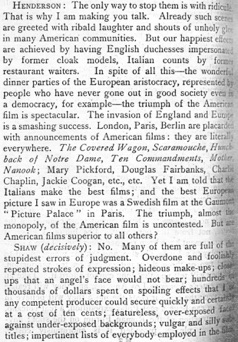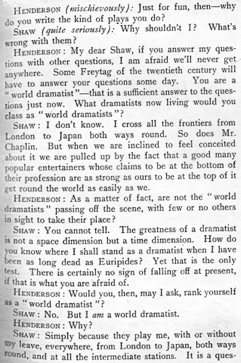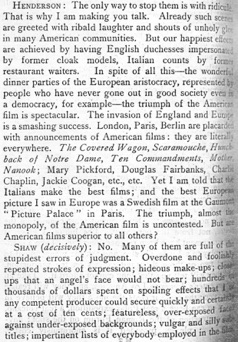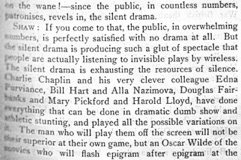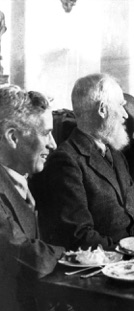The Gold Rush 1923 1925 1926 next previous
The Gold Rush Clippings 104/363
George Bernard Shaw, Fortnightly Review, London, Sept. 1924.
Charles Chaplin, George Bernard Shaw, Los Angeles,
Aug. 2, 1947, Keystone-France, detail
& Charles Chaplin with G. B. Shaw in the auditorium at the
London „City Lights“ Premiere 1931
& The G. B. S. The gentleman at the left being none other
than George Bernard Shaw, visiting the MGM studio
and there lunching at the invitation of Marion Davies. Louis B.
Mayer is beside her, Clark Gable behind the mustache.
(...) Photo, Motion Picture Herald, April 8, 1933
„That is where Mr. Chaplin scores“
Editorial content. „The Drama, The Theatre, and The Films
A dialogue between Bernard Shaw
and Archibald Henderson, his Biographer.
The dining room at 10, Adelphi Terrace, London.
Time, late March, 1924, just after the production of Shaw‘s
latest play, Saint Joan, at the New Theatre.“ (...)
„HENDERSON: The only way to stop them is with ridicule.
That is why I am making you talk. Already such scenes
are greeted with ribald laughter and shouts of unholy glee in
many American communities. But our happiest effects
are achieved by having English duchesses impersonated by
former cloak models, Italian counts by former restaurant
waiters. In spite of all this – the wonderful dinner parties of the
European aristocracy, represented by people who have
never gone out in good society even in a democracy, for example
– the triumph of the American film is spectacular. The
invasion of England and Europe is a smashing success. London,
Paris, Berlin are placarded with announcements of
American films: they are literally everywhere. The Covered
Wagon, Scaramouche, Hunchback of Notre Dame,
Ten Commandments, Mother, Nanook; Mary Pickford, Douglas
Fairbanks, Charlie Chaplin, Jackie Coogan, etc., etc.
Yet I am told that the Italians make the best films; and the best
European picture I saw in Europe was a Swedish film
at the Gaumont ,Picture Palace‘ on Paris. The triumph, almost
the monopoly, of the American film is uncontested. But
are American films superior to all others?
SHAW (decisively): No. Many of them are full of the
stupidest errors of judgment. Overdone and foolishly repeated
strokes of expression; hideous make-ups; close-ups
that an angel‘s face would not bear; hundreds of thousands
of dollars spent on spoiling effects that I think any
competent producer could secure quickly and certainly at a cost
of ten cents; featureless, over-exposed faces against
under-exposed backgrounds; vulgar and silly sub-titles; impertinent
lists of everybody employed in the film from the star actress
to the press agent‘s office boy, are only a few of the gaffes that
American film factories are privileged to make. Conceit
is rampant among your film makers; and good sense is about
non-existent. That is where Mr. Chaplin scores; but
Mr. Harold Lloyd seems so far to be the only rival intelligent
enough to follow his example. We shall soon have
to sit for ten minutes at the beginning of every reel to be told
who developed it, who fixed it, who dried it, who
provided the celluloid, who sold the chemicals, and who cut
the author‘s hair. Your film people simply don‘t know
how to behave themselves; they take liberties with the public
at every step on the strength of their reckless enterprise
and expenditure. Every American aspirant to film work should be
sent to Denmark or Sweden for five years to civilise
him before being allowed to enter a Los Angeles studio.
HENDERSON: Well, that‘s that! And how surprised and pained
Lasky, Goldwyn, Metro and Company will be to read
your cruel words! But too much success is not good for anyone –
not even for you. And speaking of comets, can plays
of conversation – ,dialectic dramas‘ – like yours be successfully
filmed?
SHAW: Barrie says that the film play of the future will have
no pictures and will consist exclusively of sub-titles.
HENDERSON: I wonder if conversation dramas are
not on the wane! – since the public, in countless numbers,
patronises, revels in, the silent drama.
SHAW: If you come to that, the public, in overwhelming
numbers, is perfectly satisfied with no drama at all.
But the silent drama is producing such a glut of spectacle that
people are actually listening to invisible plays by wireless.
The silent drama is exhausting the resources of silence. Charlie
Chaplin and his very clever colleague Edna Purviance,
Bill Hart and Alla Nazimova, Douglas Fairbanks and Mary
Pickford and Harold Lloyd, have done everything that
can be done in dramatic dumb show and athletic stunting, and
played all the possible variations on it. The man who
will play them off the screen will not be their superior at their
own game, but an Oscar Wilde of the movies who will
flash epigram after epigram at the spectators, and thus realise
Barrie‘s anticipation of more sub-titles than pictures.“ (...)
„HENDERSON (mischievously): Just for fun, then – why do
you write the kind of plays you do?
SHAW (quite seriously): Why shouldn‘t I? What‘s wrong
with them?
HENDERSON: My dear Shaw, if you answer my questions
with other questions, I am afraid we‘ll never get anywhere.
Some Freytag of the twentieth century will have to answer your
questions some day. You are a ,world dramatist‘ – that
is a sufficient answer to the questions just now. What dramatists
now living would you class as ,world dramatist‘?
SHAW: I don‘t know. I cross all the frontiers from London
to Japan both ways round. So does Mr. Chaplin. But
when we are inclined to feel conceited about it we are pulled up
by the fact that a good many popular entertainers
whose claims to be at the bottom of their profession are
as strong as ours to be at the top of it get round
the world as easily as we.
HENDERSON: As a matter of fact, are not the ,world
dramatists‘ passing off the scene, with few or no others in sight
to take their place?
SHAW: You cannot tell. The greatness of a dramatist
is not a space dimension but a time dimension. How do you know
where I shall stand as a dramatist when I have been
as long dead as Euripides? Yet that is the only test. There is
certainly no sign of falling off at present, if that is what
you are afraid of.
HENDERSON: Would you, then, may I ask, rank yourself
as a ,world dramatist‘?
SHAW: No. But I am a world dramatist.
HENDERSON: Why?
SHAW: Simply because they play me, with or without
my leave, everywhere, from London to Japan, both
ways round, and at all the intermediate stations. It is a question
not of merit, but of raw fact. My currency is as universal
as that of Sherlock Holmes, or Charley‘s Aunt, or Mary Pickford,
or Bill Hart, or Charlie Chaplin.“ (...)
Also in Harper‘s Bazaar, September 1924.
Editor of The Fortnightly Review is Frank Harris.
Redaktioneller Inhalt
The Gold Rush 1923 1925 1926 next previous

